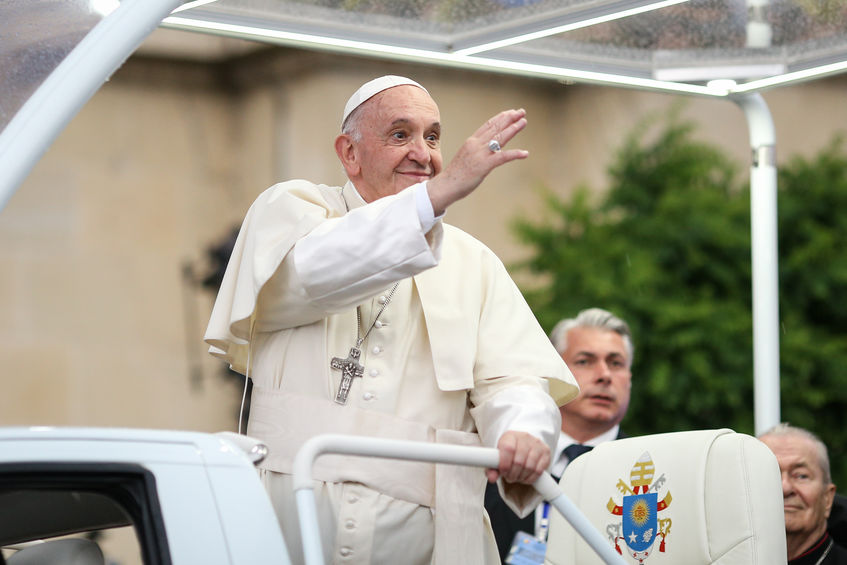Pope Francis is a man of many words, whose statements and opinions often go far afield from Catholic doctrine and religious teaching. On the subject of climate change, Francis has been loquacious and controversial.
A new book by the Pope released earlier this month, entitled Of Vices and Virtues, includes discussion of climate change, which he weaves into a morality lesson. Francis admonishes that mankind’s present course in affecting climate could bring another worldwide flood, as in the days of Noah, recorded in the Old Testament book of Genesis.
“A new Flood will come if we do not change the way on climate and glaciers,” Pope Francis wrote. This first flood was, “A great deluge, perhaps due to a rise in temperature and the melting of the glaciers, [which is] what will happen now if we continue on the same path. God unleashed his wrath,” at the time of the ancient Flood.
There are problems with these statements both on a scientific and theological level.
I will tread gingerly on the latter issue, since this is not the platform to debate religion, especially with the global leader of a major faith. With all due respect to Pope Francis, it’s worth at least passing mention that the Bible teaches God’s judgment is not coming in the form of another existential flood. Describing what many theologians call the “Noahic Covenant,” chapter nine of Genesis states, “neither shall there any more be a flood to destroy the earth,” and “the [rain]bow shall be seen in the cloud” as a reminder of this “everlasting covenant.”
This biblical account does not, of course, suggest that floods from storms or melting ice will not occur. Nonetheless, science and data show that an ever-changing climate is not leading to flooding on any worldwide scale, any time soon.
Sea levels have been rising about 3 millimeters per year, according to satellite data, which thus far is less than half the prediction made in 2014 by the Intergovernmental Panel on Climate Change. The 3mm rise itself may be overstated since it does not factor land mass increasing slightly in elevation resulting from melting glaciers and the planet’s shifting tectonic plates, as CFACT reported. Rather, sea level rise may be closer to 1 to 2mm annually.
Sea levels have been rising for centuries. The rise in the last 140 years has been mostly due to higher ocean surface temperature, likely from underwater volcano activity, not polar ice caps melting. In fact, a 2015 study by NASA found that Antarctica was accumulating ice at a rate of 112 billion tons per year, which has replaced ice lost in previous decades. Other factors unrelated to global warming or climate can affect sea level measurements, including land erosion and settling.
Dr. Jay Lehr and Terigi Ciccone report in CFACT that some of the glaciers that were receding in recent years in the northern hemisphere also are now accumulating in size, such as the Jakobshavn glacier in Greenland. The IPCC acknowledges that Earth temperatures were much warmer 4,000 to 8,000 years ago (in the days of Noah?) and more recently during the Medieval Warming Period between 1000 and 1400 A.D. Greenland’s ice sheet was evident then and in no danger of dissipating now.
The Pope’s climate assertions are nothing new. As part of his lengthy Encyclical, On Care for Our Common Home, issued in 2015, the climate discussion was bereft of scientific references. Rather, it was replete with truisms such as, “A rise in sea level can create extremely serious situations.” Well, yes; except sea level has been rising in such minuscule amounts so as not to matter. Shortly after the release of the Encyclical, ClimateDepot.com responded with a comprehensive report.
Last September, the Pope issued a statement that climate change “causes poverty and hunger [and] affects the most vulnerable.” Poverty does sadly affect millions of people worldwide, yet has declined significantly in the last 40 years, statistics show, even as the planet warmed slightly.
It is climate alarmist solutions that are a threat to the poor and vulnerable. The poverty-stricken, especially who live in developing countries, are in great need of abundant fossil fuel energy to advance economically. Michael Shellenberger, a progressive environmental activist, wrote in his recent book, Apocalypse Never, that forcing “renewable” energy climate policies on the developing world is a form of “neo-colonialism” that will ensure a “slower path to prosperity.”
A more effective side of Pope Francis was on display last weekend when he made a historic visit to the persecuted Christian community in Iraq. It was thoughtful and courageous of him to make this journey – and more fruitful than preaching climate change extremism.
